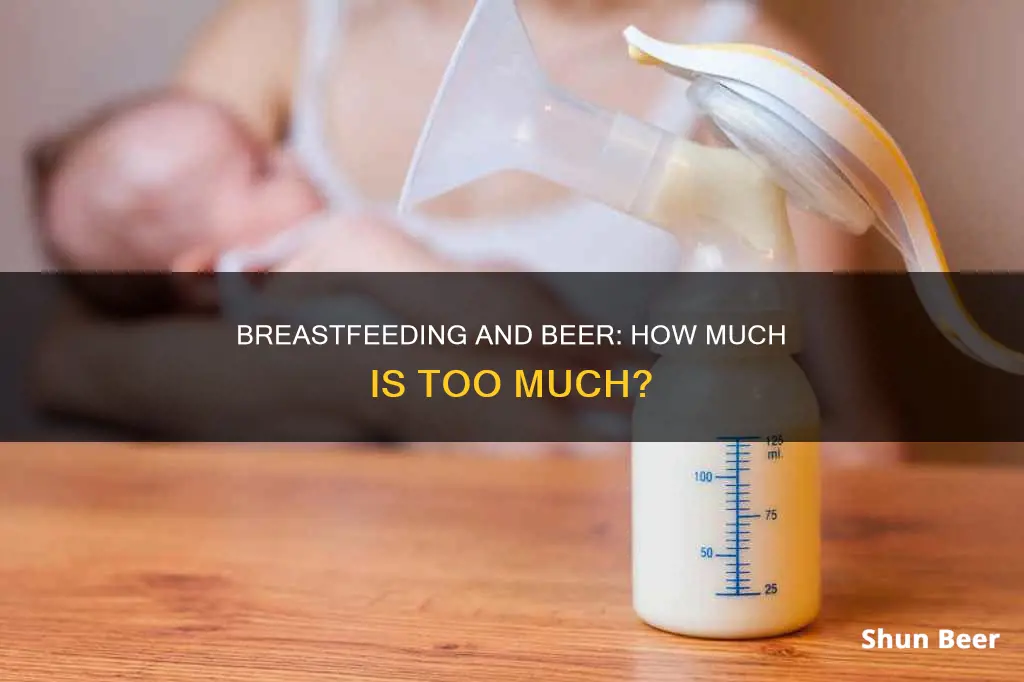
Breastfeeding mothers often receive conflicting advice about whether alcohol consumption can affect their baby. While it is widely recommended that alcohol be avoided during pregnancy, the risks of consuming alcohol while breastfeeding are less clear. It is generally considered safe to consume a small amount of alcohol while breastfeeding, as long as certain precautions are taken. According to the Centers for Disease Control and Prevention (CDC), moderate alcohol consumption (up to one standard drink per day) is generally acceptable. However, it is important to wait at least two hours after drinking before breastfeeding, as alcohol can pass into breast milk and may cause negative effects on the baby, such as drowsiness, decreased milk intake, and disrupted sleep patterns.
| Characteristics | Values |
|---|---|
| How much alcohol can you drink and breastfeed? | One drink a day hasn't been found to be harmful to a nursing baby, especially if you wait at least two hours between drinking and nursing or pumping. |
| How long after drinking can you breastfeed? | It takes about two hours for the average adult to metabolize one drink. |
| How long does alcohol stay in breast milk? | Alcohol stays in breast milk for as long as it's in your bloodstream. |
| Do you have to pump and dump after drinking? | Pumping and dumping won't reduce the amount of alcohol in your milk – only time can do that. |
| What happens if the baby drinks breast milk with alcohol? | Alcohol may change the taste of your breast milk and your baby may not like it. Other signs include an increase in crying, drowsiness, lethargy, sickness, nausea, vomiting and trouble sleeping. |
| Beer and breastfeeding: Is there a link to increased production? | There are no studies to support the claim that beer increases milk supply. |
| Tips to stay safe while drinking and breastfeeding | Drink after eating, stay hydrated, consider the baby's age and feeding schedule, and use alcohol test strips for human milk to check breast milk for alcohol. |
What You'll Learn

Occasional vs. regular drinking
Occasional drinking while breastfeeding is unlikely to harm your baby, especially if you wait at least two hours after drinking before feeding. However, regular drinking above the recommended limits can be harmful to both you and your baby.
An occasional drink is defined as one drink per day for women and two drinks per day for men. If you are breastfeeding, it is recommended to wait at least two hours after drinking before nursing your baby, as it takes about two hours for the average adult to metabolize one drink. This allows enough time for the alcohol to leave your breast milk, as the level of alcohol in your milk mimics the amount in your blood.
If you are drinking over a more extended period, such as at a wedding, you may want to pump and dump to relieve engorgement. However, this pumped milk should be discarded as it will still contain alcohol and is not safe for your baby.
Regular drinking can negatively affect your breast milk supply and your let-down reflex, a hormonal reaction that allows your body to eject milk for breastfeeding. People who drink regularly tend to have a lower milk supply, and the let-down reflex is delayed, resulting in the baby receiving less milk.
Additionally, regular drinking can cause sleep, growth, and developmental problems in your baby. It can also impair your motor skills, reaction times, decision-making skills, judgment, and overall ability to safely care for an infant. If you feel that your alcohol consumption is interfering with your ability to breastfeed or is higher than it should be, it is important to talk to your healthcare provider for support and guidance.
Beer in Ancient China: A Historical Perspective
You may want to see also

How much alcohol is in breast milk?
The amount of alcohol in breast milk depends on the amount consumed by the mother, how quickly it was consumed, whether it was consumed with food, the mother's body weight, and individual variations in alcohol absorption and metabolism.
Alcohol consumed by a mother passes freely into her breast milk, with levels in breast milk similar to those measured in maternal blood. Alcohol levels in breast milk are highest 30 to 60 minutes after an alcoholic beverage is consumed. The amount of alcohol taken in by a nursing infant through breast milk is estimated to be 5% to 6% of the weight-adjusted maternal dose.
The length of time alcohol can be detected in breast milk depends on the amount of alcohol consumed by the mother. Alcohol from one drink can typically be detected in breast milk for about 2 to 3 hours, but this extends to about 4 to 5 hours if the mother consumes two drinks, and to about 6 to 8 hours if she consumes three drinks, and so forth.
To minimise the amount of alcohol in breast milk, it is recommended that mothers wait at least 2 hours after drinking one standard drink before breastfeeding their baby.
The French and Beer: A Cultural Perspective
You may want to see also

Pumping and dumping
When to Pump and Dump:
- Alcohol Consumption: According to the CDC, it is recommended to wait for at least two hours after consuming alcohol before breastfeeding. If you drink in excess or within two hours of your usual feeding schedule, you may choose to pump and dump to ease discomfort and maintain your milk supply.
- Medication: If you are taking short-term medication that may be harmful to your breastfeeding baby, consult your doctor or pharmacist to determine if you should pump and dump. Certain prescription drugs, such as opiates, can be dangerous for infants.
- Recreational Drugs: Substances like cannabis, opioids, or cocaine stay in the system much longer than alcohol. If you consume these substances, refrain from breastfeeding and consult your doctor about how long you should wait or if pumping and dumping is appropriate.
Benefits of Pumping and Dumping:
- Relief of Discomfort: Pumping and dumping can help relieve breast engorgement and prevent health complications such as mastitis, which is an infection of the breasts.
- Maintain Milk Supply: Pumping and dumping can help you stick to your pumping schedule and maintain your milk supply, especially if you are away from your baby or unable to breastfeed for a short period.
Drawbacks of Pumping and Dumping:
- Unnecessary for Alcohol: Studies have shown that pumping and dumping does not reduce the alcohol content in breast milk. Waiting two hours after drinking alcohol is sufficient to allow it to naturally leave your breast milk as it leaves your bloodstream.
- Potential Impact on Milk Supply: If you struggle with milk production, pumping and dumping can reduce your total milk supply for the day. As long as your baby's diet is supplemented with formula, this may not be an issue.
Tips for Breastfeeding and Alcohol Consumption:
- Timing: Time your alcohol consumption right after breastfeeding or pump and store your breast milk before drinking. This way, you can ensure that your baby receives milk that is free from alcohol.
- Limit Intake: It is generally recommended to limit alcohol consumption to one drink per day or two drinks on occasion. The more drinks you have, the longer it takes for the alcohol to clear your system.
- Alternative Feeding Options: During the waiting period after drinking alcohol, you can feed your baby previously expressed milk or formula.
- Avoid Co-Sleeping After Drinking: Do not co-sleep with your baby if you have been drinking alcohol, as it increases the risk of SIDS.
Beer and Bodybuilding: Friends or Foes?
You may want to see also

Effects on the baby
Drinking alcohol while breastfeeding can have several effects on the baby. Here are some key points to consider:
Sleep Disturbances
Alcohol can disrupt the baby's sleep patterns, causing shorter sleep periods, more frequent wakefulness, and reduced total active and REM sleep. These effects can last up to 24 hours after exposure to alcohol.
Decreased Milk Intake
Alcohol can impair the mother's milk ejection reflex, resulting in a decrease in the baby's milk intake. Research suggests that infants may consume up to 20-23% less milk after exposure to alcohol in breast milk.
Impaired Weight Gain
Alcohol can negatively impact the baby's weight gain. It can cause abnormal weight gain and even slow down linear growth.
Developmental and Neurological Problems
Regular exposure to alcohol in breast milk has been linked to potential developmental and neurological issues in the baby. This includes delayed motor development and potential impairment of cognitive development.
Immune Function
Alcohol exposure can impair the baby's immune function, making them more susceptible to illnesses.
Abstract Reasoning Ability
Some studies suggest that repeated exposure to alcohol in breast milk could impact the child's ability for abstract reasoning at school age (6-7 years).
It is important to note that the effects of alcohol on the baby depend on various factors, including the amount of alcohol consumed, the timing of breastfeeding, and individual differences in metabolism. The recommendations provided by experts are meant to minimize the potential harm to the baby.
Drinking Beer While on Nitrofurantoin: What You Should Know
You may want to see also

Effects on the mother
Drinking alcohol while breastfeeding can have several effects on the mother. Firstly, it can impact the mother's letdown and breast milk flow, possibly leading to a decrease in her milk supply. Alcohol interferes with the release of oxytocin, a hormone necessary for breast milk letdown, and disrupts other hormones involved in milk production. Studies have shown that nursing after consuming alcohol can result in a decrease in the baby's milk intake by 20% to 23%.
Secondly, the amount of alcohol consumed and the frequency of drinking can influence the mother's motor skills, reaction times, decision-making abilities, judgment, and overall ability to safely care for her infant. If a mother's drinking impairs her judgment or ability to care for her baby, it is recommended to have a sober, responsible adult take over the baby's care.
Thirdly, drinking alcohol can affect the mother's sleep. It is advised not to co-sleep with the baby if the mother has been drinking, as it increases the risk of Sudden Infant Death Syndrome (SIDS).
Additionally, the time it takes for alcohol to leave a mother's system and breast milk varies depending on several factors, including the amount of alcohol consumed, the speed of consumption, whether it was consumed with food, the mother's weight, and her body's ability to metabolize alcohol. On average, it takes about two hours to metabolize one drink, and breastfeeding is considered safe again when the mother feels neurologically normal.
Lastly, while drinking alcohol in moderation while breastfeeding is generally considered safe, it is important to note that there is no safe level of alcohol consumption for overall health. Abstaining from alcohol is always the best option, whether breastfeeding or not.
Hoppy Beer and IBS: A Safe Pairing?
You may want to see also
Frequently asked questions
According to the Centers for Disease Control and Prevention (CDC), it is ideal to avoid drinking while breastfeeding. However, moderate alcohol consumption (up to one standard drink per day) is generally considered okay.
Most medical authorities, including the American Academy of Pediatrics (AAP) and CDC, recommend waiting to nurse at least two hours after your last drink.
According to the Dietary Guidelines for Americans, you should limit your alcohol consumption to no more than one drink per day. One standard drink is 12 oz. of 5% ABV beer (about one can).







